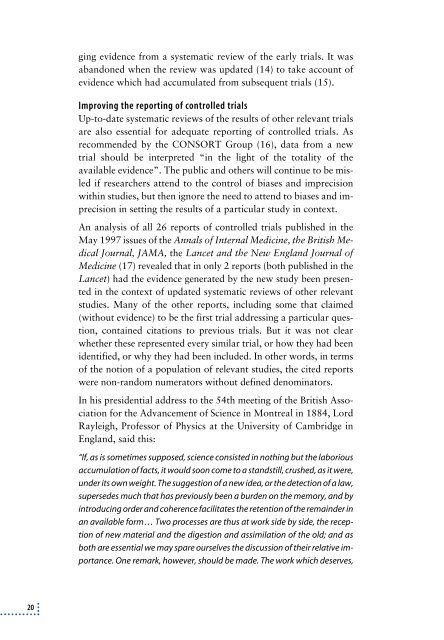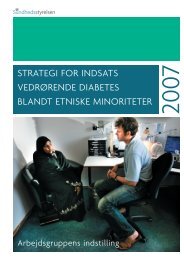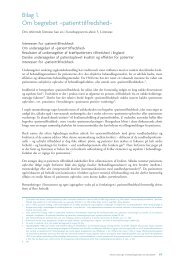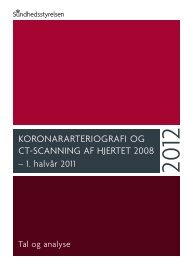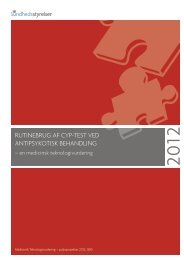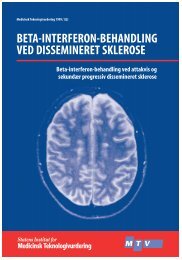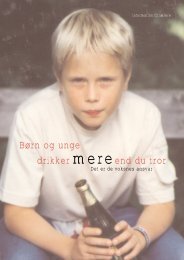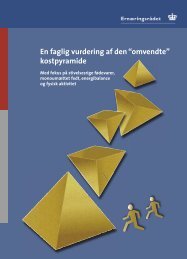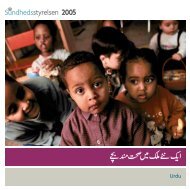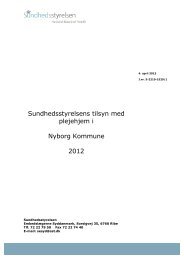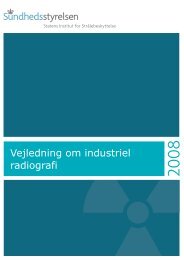MTV, sundhedstjenesteforskning og klinisk praksis
MTV, sundhedstjenesteforskning og klinisk praksis
MTV, sundhedstjenesteforskning og klinisk praksis
Create successful ePaper yourself
Turn your PDF publications into a flip-book with our unique Google optimized e-Paper software.
ging evidence from a systematic review of the early trials. It was<br />
abandoned when the review was updated (14) to take account of<br />
evidence which had accumulated from subsequent trials (15).<br />
Improving the reporting of controlled trials<br />
Up-to-date systematic reviews of the results of other relevant trials<br />
are also essential for adequate reporting of controlled trials. As<br />
recommended by the CONSORT Group (16), data from a new<br />
trial should be interpreted “in the light of the totality of the<br />
available evidence”. The public and others will continue to be misled<br />
if researchers attend to the control of biases and imprecision<br />
within studies, but then ignore the need to attend to biases and imprecision<br />
in setting the results of a particular study in context.<br />
An analysis of all 26 reports of controlled trials published in the<br />
May 1997 issues of the Annals of Internal Medicine, the British Medical<br />
Journal, JAMA, the Lancet and the New England Journal of<br />
Medicine (17) revealed that in only 2 reports (both published in the<br />
Lancet) had the evidence generated by the new study been presented<br />
in the context of updated systematic reviews of other relevant<br />
studies. Many of the other reports, including some that claimed<br />
(without evidence) to be the first trial addressing a particular question,<br />
contained citations to previous trials. But it was not clear<br />
whether these represented every similar trial, or how they had been<br />
identified, or why they had been included. In other words, in terms<br />
of the notion of a population of relevant studies, the cited reports<br />
were non-random numerators without defined denominators.<br />
In his presidential address to the 54th meeting of the British Association<br />
for the Advancement of Science in Montreal in 1884, Lord<br />
Rayleigh, Professor of Physics at the University of Cambridge in<br />
England, said this:<br />
“If, as is sometimes supposed, science consisted in nothing but the laborious<br />
accumulation of facts, it would soon come to a standstill, crushed, as it were,<br />
under its own weight. The suggestion of a new idea, or the detection of a law,<br />
supersedes much that has previously been a burden on the memory, and by<br />
introducing order and coherence facilitates the retention of the remainder in<br />
an available form… Two processes are thus at work side by side, the reception<br />
of new material and the digestion and assimilation of the old; and as<br />
both are essential we may spare ourselves the discussion of their relative importance.<br />
One remark, however, should be made. The work which deserves,<br />
20


